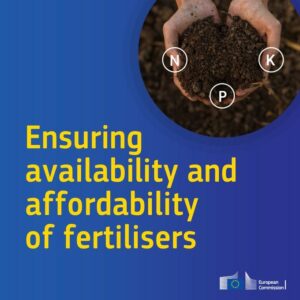 Fertilisers play a significant role for food security. Their production and their cost largely depend on natural gas. Following Russia's invasion of Ukraine, a global mineral fertiliser and energy crisis is now weighing on global food security and food prices. In this context, the European Commission presented a Communication on ensuring availability and affordability of fertilisers, on the 9th of November.
Fertilisers play a significant role for food security. Their production and their cost largely depend on natural gas. Following Russia's invasion of Ukraine, a global mineral fertiliser and energy crisis is now weighing on global food security and food prices. In this context, the European Commission presented a Communication on ensuring availability and affordability of fertilisers, on the 9th of November.
During the EU Expert Group meeting on Fertilisers on 24 September 2022, ECN has called to push for the recovery of nutrients from biowaste in the ‘Fertilisers Communication’, as biowaste is a valuable resource for providing nutrients and organic matter in sustainable organic fertilisers and soil improvers.
The overall potential of municipal biowaste is estimated between 118 and 138 million tonnes per year in the EU. Today, only 17 % of biowaste are recycled in composting and anaerobic digestion plants, which corresponds to 38 million tonnes of municipal biowaste per year. For reaching the overall recycling target of municipal solid waste of 65 % by 2035 there is a need to additionally collect 40 million tonnes of municipal biowaste separately. This will provide 40 million tonnes of compost per year, which can be used as organic fertiliser and soil improver on soils. The organic recycling of biowaste into compost and digestate does not only contribute to the energy and fertilisers crises but as well to mitigate climate change. The organic recycling keeps biowaste away from landfills, provides renewable energy (biogas & biomethane) and organic matter for soils (carbon sequestration).
The Commission underlines in its communication that ‘the substitution of mineral fertilisers by organic fertilisers is part of the solution to reduce the EU’s dependence on gas’ and ‘developing methods to extend efficient nutrient recycling of organic waste (e.g. livestock manure, anaerobic digestion, sludge and other organic waste streams) into renewable bio-based fertilising products contributes to the objectives of the Farm to Fork Strategy. An important element in this is the separation and collection of biowaste.’
For reducing the dependence of European agriculture on mineral fertilisers from outside the EU the European Commission has brought forward the following actions:
- Public consultation on the revision of the urban waste-water treatment Directive (26/10/2022) which includes stricter obligations to recover nutrients from wastewater for being reused in agriculture;
- Setting up an Integrated Nutrient Management Action Plan at the beginning of 2023 by taking the circular use of biowaste as fertilisers into account.
Please access the EU Commission’s website on Food security, where further information is provided:
